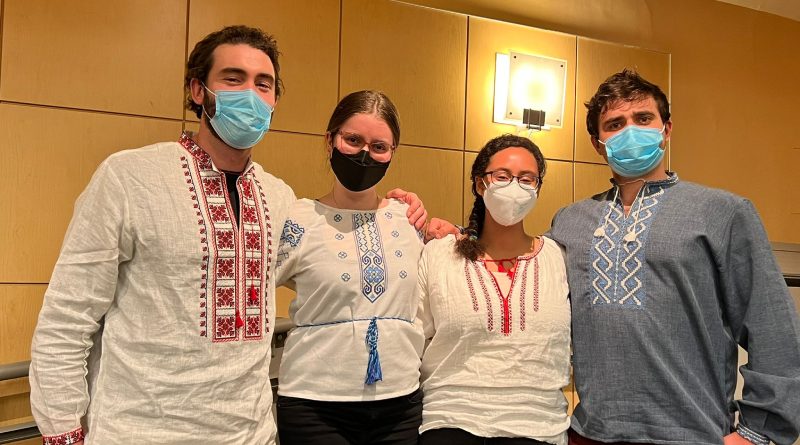How the Russian Language is at the Center of the Russia-Ukraine War
By Nastia Kukunova, MALD 2022 Candidate, The Fletcher School
Early on Thursday morning, Russian troops entered Ukraine. Following the announcement of a “special military operation,” Russian President Vladimir Putin launched a full-scale conventional war. The invasion took place after weeks of ongoing Russian military buildup around Ukraine’s borders, as well as Russia’s recognition of the self-declared Luhansk People’s Republic (LNR) and Donetsk People’s Republic (DNR) in Eastern Ukraine. In a rousing recorded speech, Putin stated that the goals were to demilitarize and denazify Ukraine, protect Ukrainians and Russians from genocide, and bring the Ukrainian government to justice for its alleged crimes. Military infrastructure, airports, and silos, were targeted by the Russian military all around Ukraine, including the capital city of Kyiv, major cities like Kharkiv and Odessa, and even cities in the West such as Ivano-Frankivsk.
In the days leading up to and following the invasion, Putin’s speeches heavily revolved around the themes of historical unity, Nazi defeat and Soviet victory in the Great Patriotic War and World War II, and righting historical wrongs. In particular, he focused on Ukraine’s domestic and foreign policy since the 2014 Maidan Revolution, calling the government a fascist junta that “committed numerous bloody crimes against civilians, including against citizens of the Russian Federation.” One of these crimes that Putin focuses on is the alleged persecution of ethnic Russians and Russian speakers.
None of this rhetoric from Putin is new. The theme of victory in World War II and the Patriotic War is constant in both Russian domestic and foreign policy, as is Russia’s focus on protecting ethnic Russians and Russian speakers in the russkiy mir, or Russian world. He has previously rebuked the Ukrainian government and other governments of former Soviet states such as Kazakhstan, Estonia, and Latvia for shifting away from the use of the Russian language, as well as has accused them of being Russophobic. Additionally, he established the Presidential Council on the Russian Language in 2014, in which goals to protect and promote the Russian language both in Russia and abroad were outlined. However, this week’s events showcase how committed and driven Putin is to these themes, and how willing he is to resort to conventional warfare to enforce his interpretation of them.
Although the 2013-2014 Maidan protests were labeled early on by the Russian government as fascist and violent, Putin did not immediately act upon his criticism. This took a turn for the worse in February 2014 when the interim Ukrainian government moved to repeal the 2012 On the Principles of the State Language Policy Law after former Ukrainian President Viktor Yanukovych fled the country. This was interpreted by some within Ukraine’s borders and in Russia as an attempt to ban the Russian language in public and private life.[1] Particularly in Crimea and Eastern Ukraine, this was a highly emotional issue, given that the regions have large ethnic Russian populations, and Russian was historically used as an official language there. Although the law was not repealed then, this still allowed Russian propaganda to exploit fears of persecution and fueled the fire for annexation in Crimea and military action in the Donbass. Consequently, it was very easy for the Russian government to present the image of a fascist Ukrainian government that would target Russians and Russian speakers, as well as those who were not pro-Europe or pro-NATO.[2] Over the years following the Maidan Revolution, policies aimed at promoting the Ukrainian language in public life were enacted. Most importantly, this included The Law on Ensuring the Functioning of Ukrainian as the State Language in 2019.
Fast forward to this week’s events: In her speech on Friday, the day after Russia’s invasion of Ukraine, Russian Ministry of Foreign Affairs Spokeswoman Maria Zakharova stated that the Ukrainian government enacted discriminatory language laws and violated the rights of ethnic minorities, most notably ethnic Russians and Russian speakers. She once again alluded to the theme of genocide and continued to describe the Ukrainian government as Nazis and fascists. This characterization is ironic, given that Ukrainian President Volodymyr Zelensky is Jewish, a Russian speaker himself, and primarily spoke Russian in his election campaign, perhaps in order to counter this narrative.
As the current chain of events continue to
evolve, compromises, or lack thereof, on language politics may continue to
drive both the Russian and Ukrainian governments in making decisions. In recent
days, Ukrainian President Volodymyr Zelensky has repeatedly made speeches calling
for peace in both Ukrainian and Russian to catch the attention of Russian
speakers both in Russia and Ukraine. Going forward, it will be interesting to
observe the role language will play in spreading Ukrainian and Russian
government narratives.
[1] Dominique Arel, “Language, Status, and State Loyalty in Ukraine,” Harvard Ukrainian Studies 35, no. 1–4 (2017-2018): 233–64.
[2] Sam Sokol, “Russian Disinformation Distorted Reality in Ukraine. Americans Should Take Note.,” Foreign Policy, August 2, 2019, https://foreignpolicy.com/2019/08/02/russian-disinformation-distorted-reality-in-ukraine-americans-should-take-note-putin-mueller-elections-antisemitism/.

